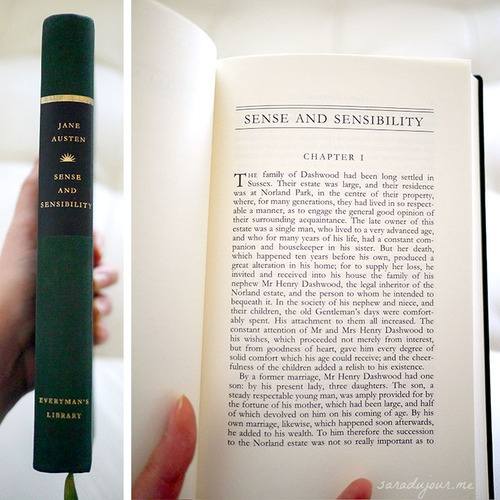Book Review: Sense and Sensibility

I’m going to say something blasphemous here. The movie was better than the book.
That’s right, you heard me. Now before you all come at me with pitchforks, allow me to make my case. First of all, Emma Thompson (one of my favourite humans) won an Oscar for her adapted screenplay of the novel. How many Oscars does Jane Austen have? None. Zip. Zilch. (This part is a joke. I am joking.)
But seriously, I do prefer the 1995 film version starring Kate Winslet as Marianne Dashwood and Emma Thompson as Elinor Dashwood to the book. I want to begin by stating (for the record) that I love the story. I’ve watched and re-watched the film countless times and it is very near and dear to my heart. I’m not at all saying that Sense and Sensibility is bad by any means. I’m merely suggesting that the story is better served by the medium of film. (I’d be interested to hear your opinion on this, though – if you disagree, please leave a comment!)
Sense and Sensibility, by Jane Austen, is a tale of two sisters. (Technically there’s a third sister, but she’s largely irrelevant.) Marianne and Elinor are similar in age but opposite in temperament. Marianne, the younger of the pair, is melodramatic, passionate, sensitive, stubborn, eager, romantic, blunt, and idealistic. Elinor, on the other hand, is reserved, polite, kind, quiet, empathetic, practical, realistic, level-headed, and self-contained. (Phew, I think I’ve filled my adjective quota for the month.)
Elinor represents the “sense” in the pair, while Marianne is the “sensibility”. She feels deeply about just about everything — even trees! I could relate to both of them, because I have Marianne’s sensitivity, her appreciation and passion for the arts, and some of her stubbornness, if I’m honest; but overall I’m much more an Elinor in temperament and behaviour.
I don’t think I’m spoiling anything, plot-wise, by saying that funds are lacking for our heroines, romance is involved, misunderstandings occur, but it all eventually ends happily. It is an Austen novel, after all, and she didn’t exactly write sci-fi or tragedies.
Overall, I found the story to be extremely slow-paced. Perhaps this was amplified because I had just finished reading Gone Girl, an absolutely thrilling page-turner.
About ninety percent of the book consists of the characters travelling around, visiting various neighbours and being visited by them, both in the country and in London. Apart from social interactions (most of which the characters themselves find boring anyway), nothing really happens. And see, that’s okay in a film, while as you wait for the plot to slowly come together, you get to enjoy beautiful music, gorgeous costumes and scenery, stunning cinematography, and lovely interiors. But as a reader, without any of those trimmings, I kept turning page after page waiting for something – anything! – to happen.
Even in the romance department, there’s a lot of longing and general unhappiness throughout, and then the joyful conclusion comes right at the very end, with barely enough time to register it, let alone feel satisfied by it.
I thought the film did a much better job in that department, too. Not only was the entire story compressed to fit a movie length (cutting out many of the unnecessary traveling/visiting bits), but the conclusion felt a lot happier and more satisfying. There was time to enjoy it, to savour the tender new relationships before the story closed.
I will say, though, that pacing aside, it is wonderfully written and well characterized. Their brother, John, and his wife Fanny, are absolutely insufferable (and provide some much-needed comic relief). What I particularly enjoyed was the relationship between the two sisters and the way they grew to better understand and appreciate one another over the course of the story. And as with all of Austen’s novels, there is fantastically subtle snark in abundance.
I should mention somewhere that I really loved Pride and Prejudice, and had no issues with pacing the way I did with this one. In P&P, you’re given breadcrumbs of pleasure throughout, so even though you’re still anticipating the happy ending, you’re not bored, frustrated, or starved for something good to happen on the journey there.
This book is actually a great reminder that while I love the idealized, romanticized version of the Regency era in England portrayed in books and films, there is NO WAY I could ever be happy actually living in that time period. Hygiene issues and women’s rights aside, I would be bored out of my mind with nothing to do day after day but sitting at home, going for walks, and visiting neighbours. On the other hand, I would probably have learned to sing and play the piano forte, which would have been nice.
I would also have had a lot more leisure time for reading. But how would I blog about it? xx
(P.S. Remember when my book reviews were nice and short? Good times.)
Sense and Sensibility, by Jane Austen – My Rating: 3/5


















































